09 Mar2021
By E. Wyatt Gordon

Learner-centered design (LCD) has become a key component of digital products and platforms; curriculum and lesson planning; and non-didactic pedagogical approaches. This paradigm foregrounds the needs of learners by meeting learners where they are. LCD proposes that all designed environments should be built around the goals, needs, activities and educational contexts of users. In essence, LCDs allow for the incorporation of the whole learner by using their preferences, strengths, weaknesses, and interests as assets that can be leveraged to strengthen learning experiences.
08 Mar2021
By Jacqueline Rodriguez
 Calling all educators! Your review and your voice is requested. AACTE is proud to work collaboratively with the National Association of Secondary School Principals (NASSP) in the Learning First Alliance coalition. Our colleagues at NASSP, alongside their Board of Directors recently stated its intent to adopt two new position statements on LGBTQ+ Students and Educators and Supporting Principals as Leaders of Special Education—and your feedback is critical. Public comments are open now through March 31.
Calling all educators! Your review and your voice is requested. AACTE is proud to work collaboratively with the National Association of Secondary School Principals (NASSP) in the Learning First Alliance coalition. Our colleagues at NASSP, alongside their Board of Directors recently stated its intent to adopt two new position statements on LGBTQ+ Students and Educators and Supporting Principals as Leaders of Special Education—and your feedback is critical. Public comments are open now through March 31.
05 Mar2021
By Janel George
This article originally appeared on the Learning Policy Institute blog and is reprinted with permission.
 When Congress passed the mammoth $2.3 trillion federal funding legislation—the Consolidated Appropriations Act of 2021—last December, most of the press focused on the package’s much-needed COVID-19 relief funds and the narrowly averted government shutdown. But nested within the legislation is game-changing language that removes a long-standing obstacle to states and school districts fulfilling Brown v. Board of Education’s promise of eliminating separate and unequal schools. Effective January 1, 2021, there is no longer a prohibition on the use of federal school transportation funds to support school integration.
When Congress passed the mammoth $2.3 trillion federal funding legislation—the Consolidated Appropriations Act of 2021—last December, most of the press focused on the package’s much-needed COVID-19 relief funds and the narrowly averted government shutdown. But nested within the legislation is game-changing language that removes a long-standing obstacle to states and school districts fulfilling Brown v. Board of Education’s promise of eliminating separate and unequal schools. Effective January 1, 2021, there is no longer a prohibition on the use of federal school transportation funds to support school integration.
25 Feb2021
By Jacqueline E. King, Ph.D.
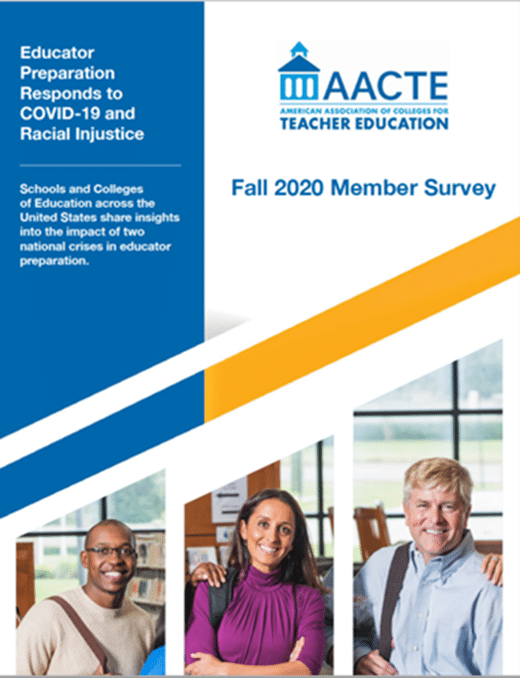 In October 2020, AACTE invited the chief representatives of its member institutions to complete a survey on how the twin crises of COVID-19 and racial injustice had affected their educator preparation programs and how they have responded to these crises. AACTE conducted a similar survey in April 2020, asking members about the immediate impact of COVID-19 on their educator preparation programs. A new report, released during the 2021 Annual Meeting, summarizes results from both surveys, tracking the evolving response of EPPs to these twin crises.
In October 2020, AACTE invited the chief representatives of its member institutions to complete a survey on how the twin crises of COVID-19 and racial injustice had affected their educator preparation programs and how they have responded to these crises. AACTE conducted a similar survey in April 2020, asking members about the immediate impact of COVID-19 on their educator preparation programs. A new report, released during the 2021 Annual Meeting, summarizes results from both surveys, tracking the evolving response of EPPs to these twin crises.
Key findings include the following:
25 Feb2021
By Katrina Norfleet
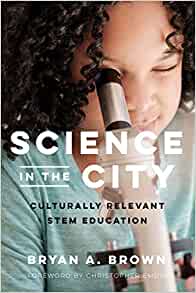 AACTE is pleased to announce Bryan A. Brown’s Science in the City: Culturally Relevant STEM Education, as the recipient of the 2021 AACTE Outstanding Book Award. Brown is being presented with the award at today’s virtual AACTE 73rd Annual Meeting Awards Forum.
AACTE is pleased to announce Bryan A. Brown’s Science in the City: Culturally Relevant STEM Education, as the recipient of the 2021 AACTE Outstanding Book Award. Brown is being presented with the award at today’s virtual AACTE 73rd Annual Meeting Awards Forum.
Science in the City: Culturally Relevant STEM Education, published by Harvard Education Press in 2019, examines how language and culture impact effective science teaching. In the book, Brown argues that teachers need to understand how cultural issues intersect with the fundamental principles of learning, and that science education can thrive if it is connected to students’ culture, backgrounds, identities, and language.
22 Feb2021
By LaMarriol Smith

Educator preparation providers (EPPs) at six minority serving institutions (MSIs) across the United States selected to participate in Branch Alliance for Educator Diversity’s (BranchED) National Teacher Preparation Transformation Center will undergo an immersion process aimed at producing highly effective and diverse teachers.
Institutions comprising BranchED’s National Teacher Preparation Transformation Center’s Cohort 2 include Alabama A&M University in Huntsville, AL, Mount Saint Mary’s University in Los Angeles, CA, Texas A&M International University in Laredo, Texas, University of La Verne in La Verne, CA., Virginia State University in Petersburg, VA, and West Texas A&M University in Canyon, Texas. The pre-kindergarten through 12th-grade (PK-12) school district partners for these respective institutions also participate in the Transformation Center.
22 Feb2021
By Weade James

AACTE recognizes the challenges that many of our members are facing because of the recent winter storms. We believe that your safety and well-being are most important. As such, we are extending the application deadline for the Consortium for Research-Based and Equitable Assessments (CREA). The new deadline to apply is March 5 at 11:59 p.m. EST.
We appreciate the overwhelming interest that have been expressed to join the Consortium and hope that this extension will provide much needed respite to those impacted by widespread power and utility outages, and other challenges to their everyday needs. Given the new deadline, all applicants will be notified of their application decision on March 22, 2021.
Please direct any questions about the Call for Applications to me at wjames@aacte.org.
18 Feb2021
By Christina Sneed
“The 1619 Project” Annual Meeting Deeper Dive session on Friday, February 26, 11:15 a.m. – 12:30 p.m. features Mary Elliott, curator at the Smithsonian National Museum of African American History and Culture (NMAAHC), and Christina Sneed, high school AP English teacher in University City Schools (outside of St. Louis, MO) who taught The 1619 Project and authored the curriculum resources for The Pulitzer Center’s 1857 Project. Inspired by The 1619 Project (which reframes U.S. history by placing the consequences of slavery and the contributions of Black Americans at the very center of the historical narrative), The 1857 Project examines the Dred Scott decision and the Lincoln-Douglass Debate. In this article, Sneed shares insight into her experience teaching The 1619 Project to higher schoolers and how educators can successfully implement it across curriculum.
 I’ve been sharing my approach to teaching with the New York Times’ 1619 Project and was disturbed to read an article where Rodriguez (2021) explained that Republican lawmakers in five states (one in which I live) are introducing legislation to “punish schools that provide lessons derived from this project.” Unfortunately, we’ve seen this strategy used throughout history as a method to manipulate national memory. It forces reflection on the quandary, “Who gets to write history?” The answer is rooted in white supremacy. Recollect America’s Reconstruction period when the United Daughters of the Confederacy distorted the narrative surrounding who won the Civil War by using propaganda, monuments, and education-based indoctrination. They created state-sanctioned counter narratives that still plague America. Recently, Republicans used this tactic to establish the 1776 Commission in opposition to the 1619 Project. Such acts stem from fear that, if average Americans learn accurate accounts of history—without white washing, omission, erasure—white men will lose power. They fear teachers will inform students of America’s ugliest parts and sell a version of history that negatively depicts certain groups of people in order to create ”heroes” and “patriots” in others (what they’ve been guilty of for centuries).
I’ve been sharing my approach to teaching with the New York Times’ 1619 Project and was disturbed to read an article where Rodriguez (2021) explained that Republican lawmakers in five states (one in which I live) are introducing legislation to “punish schools that provide lessons derived from this project.” Unfortunately, we’ve seen this strategy used throughout history as a method to manipulate national memory. It forces reflection on the quandary, “Who gets to write history?” The answer is rooted in white supremacy. Recollect America’s Reconstruction period when the United Daughters of the Confederacy distorted the narrative surrounding who won the Civil War by using propaganda, monuments, and education-based indoctrination. They created state-sanctioned counter narratives that still plague America. Recently, Republicans used this tactic to establish the 1776 Commission in opposition to the 1619 Project. Such acts stem from fear that, if average Americans learn accurate accounts of history—without white washing, omission, erasure—white men will lose power. They fear teachers will inform students of America’s ugliest parts and sell a version of history that negatively depicts certain groups of people in order to create ”heroes” and “patriots” in others (what they’ve been guilty of for centuries).
13 Feb2021
By Katrina Norfleet
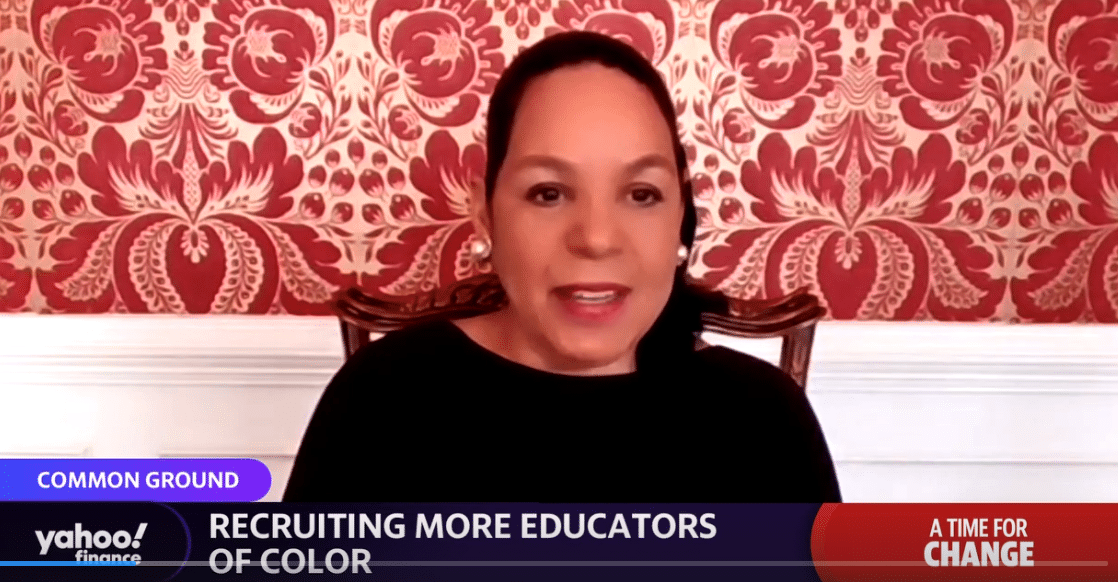 Findings show that in the public school system nationwide, only 7% of teachers, 11% of principals, and 3% of superintendents are Black. In the following Yahoo Finance Live video interview, AACTE Dean in Residence Leslie Fenwick explores this topic. She discusses the impact desegregation of public schools has had on the decline of the Black teacher pipeline and what steps should be taken to reverse the trend.
Findings show that in the public school system nationwide, only 7% of teachers, 11% of principals, and 3% of superintendents are Black. In the following Yahoo Finance Live video interview, AACTE Dean in Residence Leslie Fenwick explores this topic. She discusses the impact desegregation of public schools has had on the decline of the Black teacher pipeline and what steps should be taken to reverse the trend.
Watch the video.
11 Feb2021
By Terrance McNeil
The members of AACTE’s HBCU Teacher Education Topical Action Group (TAG) are very proud of the contributions of Historically Black Colleges and Universities’ (HBCU) educators and researchers and the work that they have done within and beyond academia. More importantly, we commend the contributions made through the discourse and praxis on equity in education. We want to celebrate these contributions and promote the excellence that emanates from HBCU educator preparation programs. We look forward to your participation at our annual business virtual meeting on February 23, 2021 from 4:00 to 6:00 pm.
In keeping with this year’s theme, Resisting Hate, Restoring Hope: Engaging in Courageous Action, The HBCU Teacher Education TAG will engage in a discussion on how we are instrumental in this purpose by using our unique positionally to provide leadership on issues of diversity and inclusion. We hope you will consider joining us.
05 Feb2021
By Jacqueline Rodriguez

Educator preparation programs have experienced a tumult of change in the last 12 months. Many of our members have experienced decreased enrollment in initial licensure teacher education programs, all during a nationwide teacher shortage. Now, more than ever before, it is our responsibility to consider what may be creating barriers for candidates to enter our programs and our profession. AACTE plans to support member institutions’ examination of assessments used for entry into preparation programs and the barriers they create for potential candidates, especially candidates of color.
02 Feb2021
By Michael W. Apple

During the virtual AACTE 2021 Annual Meeting, attendees are invited to join their peers at the Learning Lab session, Disrupting Inequities: Local and Global initiatives for Shared Responsibility in Diversity, Equity, and Social Justice on Friday, February 26, 10:00 – 11:00 a.m. AACTE member
Michael W. Apple of the University of Wisconsin addresses this topic in the following thought leadership article.
Schools, particularly public schools, are under a great threat right now. And as education leaders, it’s imperative that we understand the current environment. There is a growing anger towards our educational system that is visible statewide and at a national level. Fueled by restorative politics, many of those who have lost their faith in public schools believe that educators place too much emphasis on equitable education. Yet, while much more needs to be done, the simple fact that some people are criticizing schools must mean that we must be doing something right already. If we weren’t working at interrupting racial injustice many people, especially those who are ultra-rightists, wouldn’t be so angry at schools and teachers.
29 Jan2021
By Bianca Nightengale-Lee
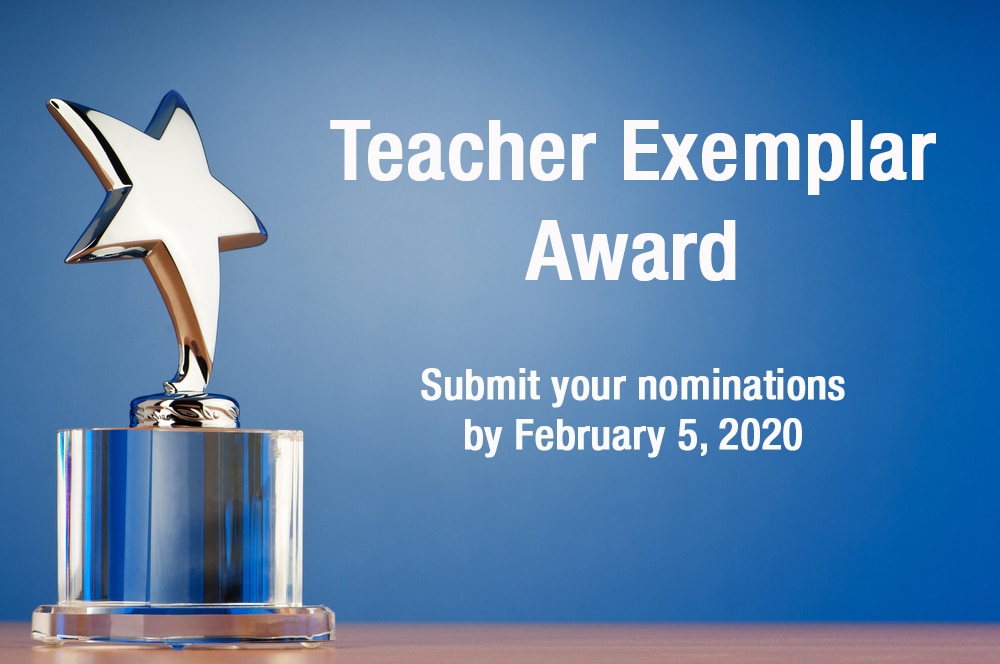
The Teacher Exemplar Award is presented by the AACTE Diversified Teacher Workforce (DTW) Topical Action Group (TAG) to recognize exceptional student/clinical teachers of Color and PK-12 mentor/cooperating teachers who serve as mentors to student/clinical teachers in field experiences. The instructional pedagogies and practices embodied by the recipients of this award reflects the DTW TAG mission and goals and advances our current understanding of the importance of cultivating a diversified teaching workforce that enhances educational opportunities for ethnically, culturally, and linguistically diverse students.
Recipients of these awards have demonstrated effective instructional/pedagogical practices, advocacy skills, and a service-minded disposition toward addressing inequities through their teaching, participation in local community, school, and/or grassroots service efforts. In recognition and honor of this important work, the recipients will receive a $500 honorarium each and be recognized in our 2021 DTW Virtual Institute. Also, the recipients will be asked to participate on the planning committee of the 2022 DTW Institute.
25 Jan2021
By Weade James
 AACTE is pleased to announce the Call for Applications for the Consortium for Research-Based and Equitable Assessments (CREA). Funded by the Bill and Melinda Gates Foundation, the purpose of the Consortium is to convene stakeholders across various states to (1) examine how cut scores for entrance into educator preparation programs are currently set, (2) identify guidelines and recommendations for setting equitable cut scores for Praxis I and similar assessments, and (3) develop model state policies that seek to attract and prepare diverse teacher candidates for the profession.
AACTE is pleased to announce the Call for Applications for the Consortium for Research-Based and Equitable Assessments (CREA). Funded by the Bill and Melinda Gates Foundation, the purpose of the Consortium is to convene stakeholders across various states to (1) examine how cut scores for entrance into educator preparation programs are currently set, (2) identify guidelines and recommendations for setting equitable cut scores for Praxis I and similar assessments, and (3) develop model state policies that seek to attract and prepare diverse teacher candidates for the profession.
The Consortium of state teams shall be comprised of educator preparation programs and representatives from state and local education agencies. Participants must commit to one full year of participation, which will include quarterly meetings and pre-work between meetings to accomplish the goals of the Consortium.
19 Jan2021
By Maria Hyler
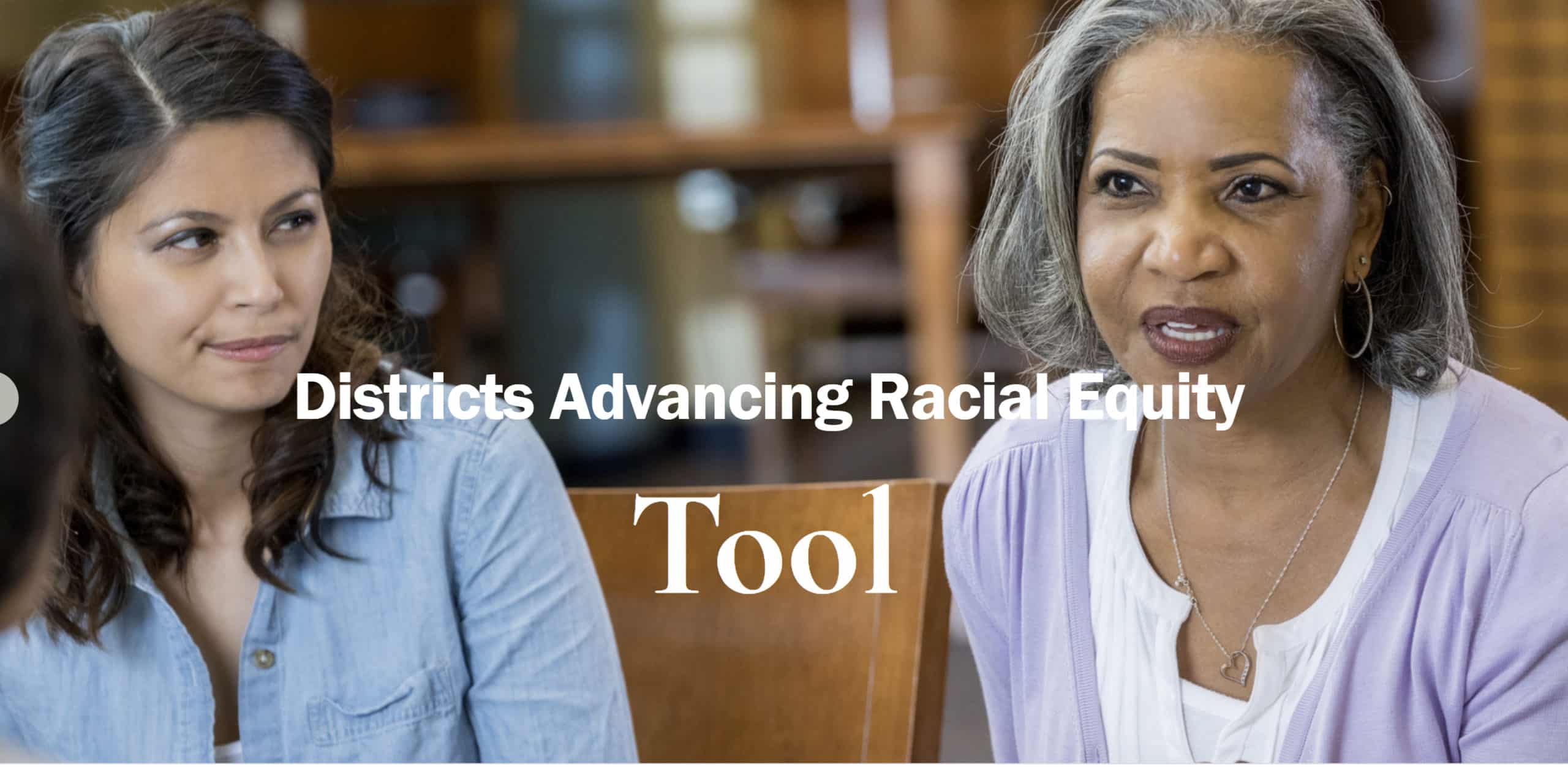
This article originally appeared on the Learning Policy Institute website an is reprinted with permission. The article was written by Maria E. Hyler, Desiree Carver-Thomas, Marjorie Wechsler, and Larkin Willis.
Decades of reforms have proven insufficient to address persistent racial disparities in educational opportunities. In school systems across the United States, meaningful efforts to ensure access to strong educational opportunities require a bold and significant shift. Policies and practice must not only prevent discrimination; they must move beyond simple notions of equality—in which every student gets the same—to equity—in which all students get what they need to develop academically, socially, emotionally, and physically.
School leaders who have been committed to racial equity understand the historical legacy of structural racism that reaches to our present context and that results in the educational opportunity gaps that students still experience. District staff who have focused on racial equity recognize that students’ individualized experiences, opportunities, and successes in school are deeply contextualized in the social reality of institutionalized racism across the United States. They seek to educate the individuals and ameliorate the systems that perpetuate inequitable opportunities and resulting outcomes for students.








 Calling all educators! Your review and your voice is requested. AACTE is proud to work collaboratively with the National Association of Secondary School Principals (NASSP) in the Learning First Alliance coalition. Our colleagues at NASSP, alongside their Board of Directors recently stated its intent to adopt two new position statements on
Calling all educators! Your review and your voice is requested. AACTE is proud to work collaboratively with the National Association of Secondary School Principals (NASSP) in the Learning First Alliance coalition. Our colleagues at NASSP, alongside their Board of Directors recently stated its intent to adopt two new position statements on  When Congress passed the mammoth $2.3 trillion federal funding legislation—the
When Congress passed the mammoth $2.3 trillion federal funding legislation—the  In October 2020, AACTE invited the chief representatives of its member institutions to complete a survey on how the twin crises of COVID-19 and racial injustice had affected their educator preparation programs and how they have responded to these crises. AACTE conducted a similar survey in April 2020, asking members about the immediate impact of COVID-19 on their educator preparation programs. A new
In October 2020, AACTE invited the chief representatives of its member institutions to complete a survey on how the twin crises of COVID-19 and racial injustice had affected their educator preparation programs and how they have responded to these crises. AACTE conducted a similar survey in April 2020, asking members about the immediate impact of COVID-19 on their educator preparation programs. A new  AACTE is pleased to announce Bryan A. Brown’s Science in the City: Culturally Relevant STEM Education, as the recipient of the 2021 AACTE Outstanding Book Award. Brown is being presented with the award at today’s virtual AACTE 73rd Annual Meeting Awards Forum.
AACTE is pleased to announce Bryan A. Brown’s Science in the City: Culturally Relevant STEM Education, as the recipient of the 2021 AACTE Outstanding Book Award. Brown is being presented with the award at today’s virtual AACTE 73rd Annual Meeting Awards Forum.

 I’ve been sharing my approach to teaching with the New York Times’ 1619 Project and was disturbed to read an article where Rodriguez (2021) explained that Republican lawmakers in five states (one in which I live) are introducing legislation to “punish schools that provide lessons derived from this project.” Unfortunately, we’ve seen this strategy used throughout history as a method to manipulate national memory. It forces reflection on the quandary, “Who gets to write history?” The answer is rooted in white supremacy. Recollect America’s Reconstruction period when the United Daughters of the Confederacy distorted the narrative surrounding who won the Civil War by using propaganda, monuments, and education-based indoctrination. They created state-sanctioned counter narratives that still plague America. Recently, Republicans used this tactic to establish the 1776 Commission in opposition to the 1619 Project. Such acts stem from fear that, if average Americans learn accurate accounts of history—without white washing, omission, erasure—white men will lose power. They fear teachers will inform students of America’s ugliest parts and sell a version of history that negatively depicts certain groups of people in order to create ”heroes” and “patriots” in others (what they’ve been guilty of for centuries).
I’ve been sharing my approach to teaching with the New York Times’ 1619 Project and was disturbed to read an article where Rodriguez (2021) explained that Republican lawmakers in five states (one in which I live) are introducing legislation to “punish schools that provide lessons derived from this project.” Unfortunately, we’ve seen this strategy used throughout history as a method to manipulate national memory. It forces reflection on the quandary, “Who gets to write history?” The answer is rooted in white supremacy. Recollect America’s Reconstruction period when the United Daughters of the Confederacy distorted the narrative surrounding who won the Civil War by using propaganda, monuments, and education-based indoctrination. They created state-sanctioned counter narratives that still plague America. Recently, Republicans used this tactic to establish the 1776 Commission in opposition to the 1619 Project. Such acts stem from fear that, if average Americans learn accurate accounts of history—without white washing, omission, erasure—white men will lose power. They fear teachers will inform students of America’s ugliest parts and sell a version of history that negatively depicts certain groups of people in order to create ”heroes” and “patriots” in others (what they’ve been guilty of for centuries). Findings show that in the public school system nationwide, only 7% of teachers, 11% of principals, and 3% of superintendents are Black. In the following Yahoo Finance Live video interview, AACTE Dean in Residence Leslie Fenwick explores this topic. She discusses the impact desegregation of public schools has had on the decline of the Black teacher pipeline and what steps should be taken to reverse the trend.
Findings show that in the public school system nationwide, only 7% of teachers, 11% of principals, and 3% of superintendents are Black. In the following Yahoo Finance Live video interview, AACTE Dean in Residence Leslie Fenwick explores this topic. She discusses the impact desegregation of public schools has had on the decline of the Black teacher pipeline and what steps should be taken to reverse the trend. 

 AACTE is pleased to announce the Call for Applications for the Consortium for Research-Based and Equitable Assessments (CREA). Funded by the Bill and Melinda Gates Foundation, the purpose of the Consortium is to convene stakeholders across various states to (1) examine how cut scores for entrance into educator preparation programs are currently set, (2) identify guidelines and recommendations for setting equitable cut scores for Praxis I and similar assessments, and (3) develop model state policies that seek to attract and prepare diverse teacher candidates for the profession.
AACTE is pleased to announce the Call for Applications for the Consortium for Research-Based and Equitable Assessments (CREA). Funded by the Bill and Melinda Gates Foundation, the purpose of the Consortium is to convene stakeholders across various states to (1) examine how cut scores for entrance into educator preparation programs are currently set, (2) identify guidelines and recommendations for setting equitable cut scores for Praxis I and similar assessments, and (3) develop model state policies that seek to attract and prepare diverse teacher candidates for the profession. 